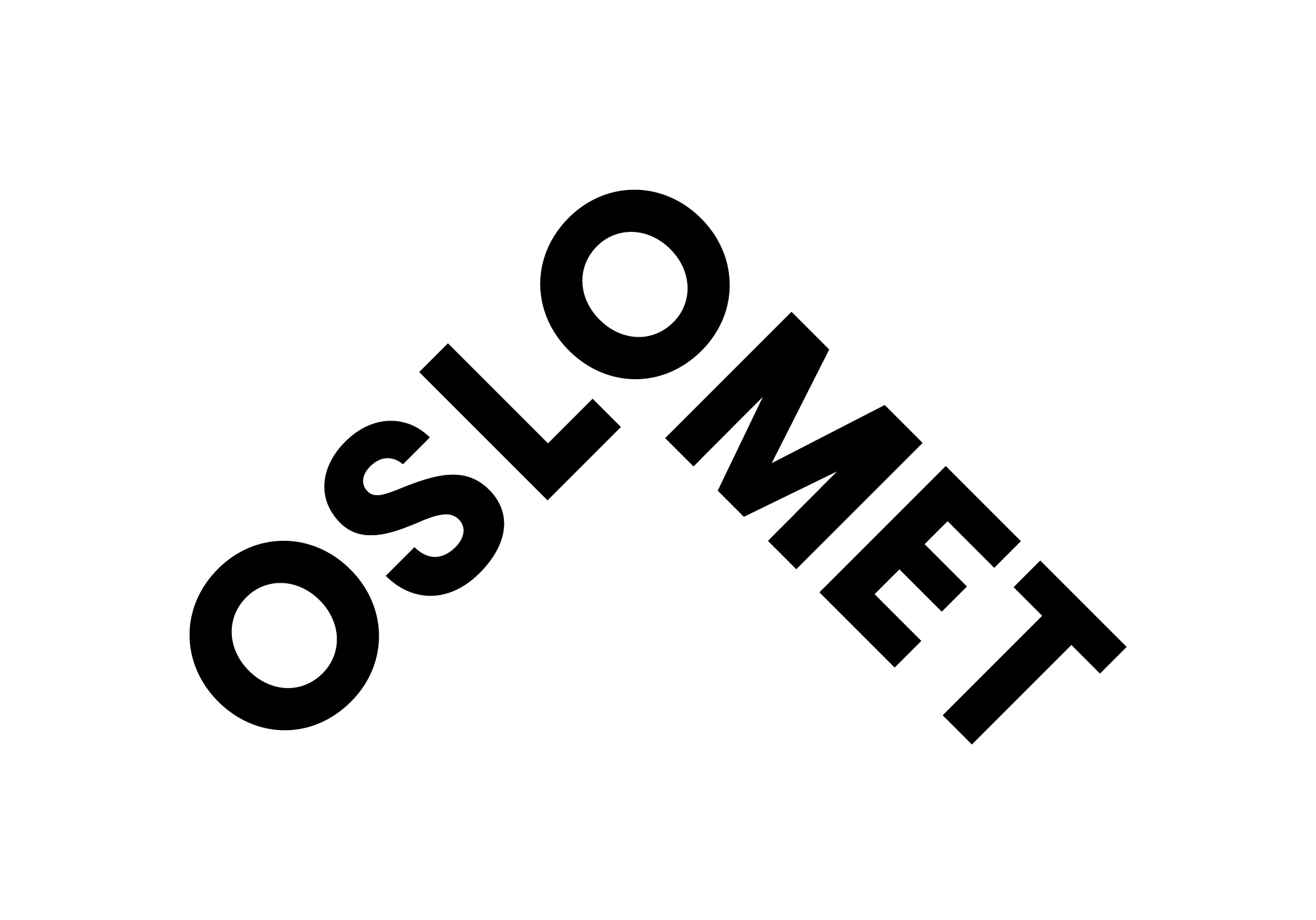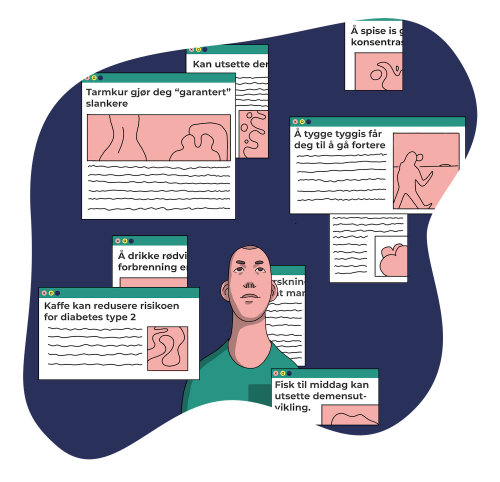About the project
Every day we encounter various health claims about what can make us healthier, sicker or prevent us from getting sick. Advice on «what works» is given on social media, in advertisements and in traditional media, but also by family and friends. For example, we can read that «Coffee leads to cancer», «Owning a dog makes you less depressed» or that «Vitamin-C prevents colds».
Many do not have enough knowledge to assess the reliability of such claims. The consequences can be that one listens to advice that can be harmful and that one does not use forms of treatment that have been proven useful. This in turn can lead to unnecessary suffering and wasted resources.
Behind the headlines is an interdisciplinary teaching and research project at the Faculty of Health Sciences, OsloMet. The main goal is to raise the competence of students at OsloMet in critically evaluating health claims.
As part of the project, we develop teaching resources, initiate research projects and lead a network for those who teach critical thinking. Although Behind the Headlines is mainly aimed at students at OsloMet, our teaching resources can also be used to teach students in primary school and in upper secondary school.
Who we are
Behind the headlines consists of an interdisciplinary working group with a background in health service research, research methods, journalism, technological science, and library and information science. Students are also part of the working group and help create learning resources including films and games.
Project Management
Astrid Dahlgren, Professor, Faculty of Health Sciences, OsloMet
Working group
- Alina Láng, studentassistent, OsloMet
- Anja Naper, universitetslektor, Institutt for sykepleie og helsefremmende arbeid, OsloMet
- Elizabeth Paulsen, universitetslektor, Institutt for sykepleie og helsefremmende arbeid, OsloMet
- Hanne Vollen, spesialbibliotekar, Universitetsbiblioteket, OsloMet
- Maria Hjørdis Katrin Fyhn, universitetsbibliotekar, Universitetsbiblioteket, OsloMet
- Marit Christiansen, seniorrådgiver, Avdeling for samfunnskontakt og kommunikasjon, OsloMet
- Maryam Amini, student, Master i Digital læringsdesign, OsloMet
Reference group
- Anders Graver Knudsen, førstelektor, Fakultet for samfunnsvitenskap, OsloMet
- Astrid Torbjørnsen, førsteamanuensis, Fakultet for helsevitenskap, OsloMet
- Atle Fretheim, fagdirektør/senterleder, Senter for forskning på epidemitiltak, Folkehelseinstituttet
- Christine Holst, forsker, Senter for forskning på epidemitiltak, Folkehelseinstituttet
- Hilde Tinderholt Myrhaug, førsteamanuensis, Fakultet for helsevitenskap, OsloMet
- Håvard Aaslund, førsteamanuensis, Fakultet for samfunnsvitenskap, OsloMet
- Ida Kristin Ørjasæter Elvsaas, stipendiat, Fakultet for helsevitenskap, OsloMet
- Kim Gunnar Helsvig, professor, Fakultet for lærerutdanning og internasjonale studier, OsloMet
- Laurence Habib, dekan/professor, Fakultet for teknologi, kunst og design, OsloMet
- Marianne Molin, professor, School of Health Sciences, Kristiania
- Nikola Holm, universitetslektor, Fakultet for teknologi, kunst og design, OsloMet
- Sarah Ellen Rosenbaum, forsker, Senter for forskning på epidemitiltak, Folkehelseinstituttet
- Stig Nøra, fungerende seksjonssjef, Seksjon for samfunnskontakt og forskningsformidling, OsloMet
- Tulpesh Patel, førsteamanuensis, Fakultet for teknologi, kunst og design, OsloMet
What we teach
In Norway, those who work in the health and welfare services must work according to the principles underlying evidence-based practice. In order for the service to be evidence-based, good quality research must be used as a basis. Research answers several types of questions, some questions are about researching how many people have a disease or are at risk, how those who get sick fare, what are the causes of disease, how something is experienced and not least what is effective treatment.
Many people think that research can be difficult, this also applies to healthcare personnel. At OsloMet, all bachelor students at the Faculty of Health Sciences receive training in evidence-based practice so that they will be equipped to use such knowledge when they go out and practice their profession. As part of this subject, they also receive training in breaking myths and exposing unreliable claims they encounter in the media and other parts of society that deal with the effect of various forms of treatment.
Behind the headlines is based on the international project Informed Health Choices (IHC) (Informedhealthchoices.org). We teach and develop learning resources based on the framework developed by the IHC project. This framework consists of key concepts that help us evaluate claims, recognize reliable research, and make informed choices.
Educational resources
While the majority of our educational resources are in Norwegian, the following are available in English:
How to study intervention effects in health, education and social sciences

In this film, the learning outcome is knowledge about evaluation research and how to research the effects of interventions in health, education and social sciences. The film provides an introduction to randomized controlled trials and observational studies and when each is most appropriate. The film also provides an introduction to the need to use knowledge summaries. The resource has been developed with bachelor’s level students as the target group, but may also be relevant in teaching students in upper secondary education as well as for master’s students depending on prior knowledge.
How to study intervention effects in health, education and social sciences
How to assess the quality of evidence in health, education and social sciences

In this film, the learning outcome is knowledge about how we assess the quality of evaluation research on the effect of interventions in health, education and social sciences. The film presents key principles that can be used in such assessment: 1) interventions should be compared; 2) the comparison groups should be similar; 3) the participants’ and researchers’ assumptions about the expected effect must not influence the results; and 4) outcomes should be measured consistently and all participants should be held accountable. The resource has been developed with bachelor’s level students as the target group, but may also be relevant in teaching master’s students.
How to assess the quality of evidence in health, education and social sciences
How to assess the quality of systematic reviews

In this film, the learning outcome is knowledge about which quality criteria you should look for when assessing the reliability of knowledge summaries about the effect of interventions (systematic reviews). The film is based on international guidelines for good practice and is relevant for all students who will learn how to use summarized research in their studies – from bachelor to Ph.D level.
How to assess the quality of a systematic review
Making informed decisions about interventions in health, education and social sciences

In this film, the learning outcome is what one should think about when choosing to introduce an intervention. The resource is interdisciplinary and is suitable for students in e.g. pedagogy, health sciences, technology and social sciences.
In the film, one is introduced to the principle of scientific uncertainty, working methodology for assessing such uncertainty (GRADE), that all measures can have both advantages and disadvantages, the principle of strong and weak recommendations in guidelines and that knowledge must be seen in the light of context and current need.
The film is based on international guidelines for good practice and is relevant for all students who will learn how to use summarized research in their studies – from bachelor to Ph.D level.
Making informed decisions about interventions in health, education and social sciences
Introduction to evidence- based practice: critical thinking about treatment claims
This resource was developed at the Faculty of Health Sciences at OsloMet by the strategic project «Behind the Headlines». Here you will get an introduction to critical thinking about health claims and a preparatory course for evidence-based practice.
Implementation
The teaching is divided into four modules that must be completed in numerical order. At the end, we have added a test-yourself task where students can check what they have learned.
The teaching does not require any teacher follow-up, but is designed so that students can go through it on their own. The course can be completed as group work, either at home or at school. It is expected that students will be able to complete the course within three teaching hours. Each module contains interactive tasks to support students’ learning.
Introduction to evidence- based practice: critical thinking about treatment claims
Course in evaluation research on the effect of interventions in health, education and social sciences
This resource has been developed at the Faculty of Health Sciences at OsloMet by the strategic project «Behind the Headlines». Here you will get an introduction to the principles that underpin evaluating the effect of various interventions in health, education and social sciences.
Implementation
The four modules must be completed in numerical order. At the end, there is an «Escape-room» where the student can check what they have learned. The teaching initially requires no teacher follow-up, but is designed to be student-driven. Each module contains interactive tasks to support student learning.
We recommend this as a course in preparation for further in-depth teaching in research methods or quality improvement for bachelor or master students.
Course in evaluation research on the effect of interventions in health, education and welfare

